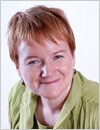Authors
Karen Hume is a well known Canadian teacher, administrator, author, speaker, and workshop leader. The winner of three "Teacher of the Year" awards, Karen has taught all but four grades in K-12 (she especially enjoyed Grades 7 and 8), and has also been a teacher-librarian. As an administrator, Karen worked in a high-needs K-8 school and then led her district's efforts in reculturing schools to meet the needs of at-risk and struggling learners in Grades 7-12.
Karen has her M.Ed. in curriculum and teacher development, has been a member of a university research group funded to investigate the role of talk in the classroom, and is a member of the editorial board of an online action research journal.
Karen's writing, workshop facilitation, and keynote addresses revolve around differentiated instruction, which she sees as an organizing framework for everything that happens in teaching and learning at all levels of a school system. Her specific areas of interest within this framework include effective and responsive instruction and assessment; engaging the adolescent learner; developing effective learning communities for students and adults; literacy education; evidence-informed decision making; and change processes for adult learners.
For more information, please visit her website.

Karen Hume is a well known Canadian teacher, administrator, author, speaker, and workshop leader. The winner of three "Teacher of the Year" awards, Karen has taught all but four grades in K-12 (she especially enjoyed Grades 7 and 8), and has also been a teacher-librarian. As an administrator, Karen worked in a high-needs K-8 school and then led her district's efforts in reculturing schools to meet the needs of at-risk and struggling learners in Grades 7-12.
Karen has her M.Ed. in curriculum and teacher development, has been a member of a university research group funded to investigate the role of talk in the classroom, and is a member of the editorial board of an online action research journal.
Karen's writing, workshop facilitation, and keynote addresses revolve around differentiated instruction, which she sees as an organizing framework for everything that happens in teaching and learning at all levels of a school system. Her specific areas of interest within this framework include effective and responsive instruction and assessment; engaging the adolescent learner; developing effective learning communities for students and adults; literacy education; evidence-informed decision making; and change processes for adult learners.
For more information, please visit her website.
